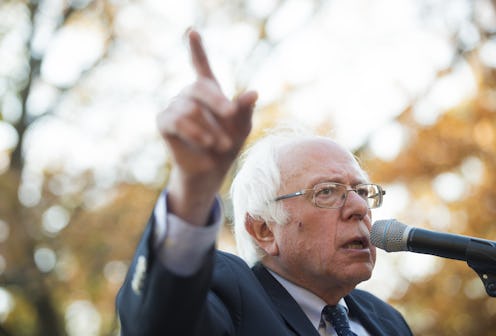News
Sanders' MLK Speech Is About More Than Celebration

It's clear that the civil rights movement and its leaders deserve to be celebrated. But one activist had something to say about the difference between celebration and taking action. Sen. Bernie Sanders' Martin Luther King Jr. Day speech pointed out that Dr. King's words and actions continue to apply to present day events — and that there's still so much more to be done in the field of civil rights.
Dr. King is most famously remembered for his principle of nonviolence in civil disobedience. But something people often gloss over is the link he made between racism and economic injustice, a connection the senator made ample note of during his speech. In fact, the 1963 March on Washington where Dr. King made his famous "I Have a Dream" speech was officially known as the "March on Washington for Jobs and Freedom," historian Maurice Isserman told The Nation.
As Sanders pointed out, up until his 1968 death, Dr. King continued to advocate for economic and civil rights through his speeches and actions. This advocacy carries over to the civil rights movements of today, such as Black Lives Matter and the protests against police brutality. More than anything, the tradition of Dr. King, which is reflected by these powerful movements, involves putting your money where your mouth is. In other words, you should use both your voice and physical presence to make a point.
Dr. King advocated for a "radical redistribution of political and economic power" and believed that such dramatic change could be brought about by nonviolent protest. Through his MLK Day speech, Sanders embodied Dr. King's spirit with a passionate call to action. "If you honestly believe in what Dr. King stood for then stop the voter suppression," Sanders told a crowd in Atlanta's packed Ebenezer Baptist Church, The Atlanta Journal-Constitution reported. He added that Dr. King "would join us in saying maybe we should be investing in jobs and education, not jails and incarceration."
During one 1968 speech in Washington, D.C., Dr. King indicated, "There is nothing new about poverty. What is new is that we now have the techniques and the resources to get rid of poverty. The real question is whether we have the will." On this Martin Luther King Jr. Day, consider whether you have the will. And if you do, consider what you can do with that will to improve people's lives. Because, as Sen. Sanders pointed out, Dr. King's legacy is one of both peace and action.